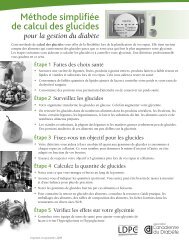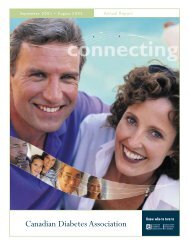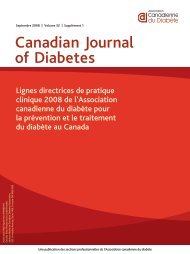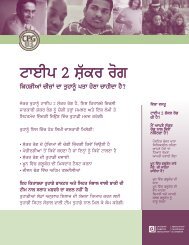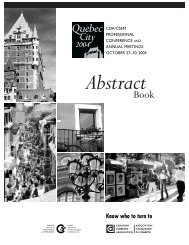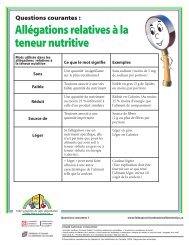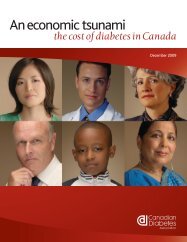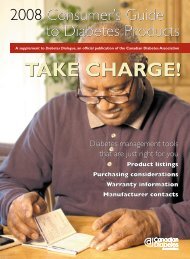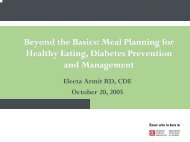2008 Clinical Practice Guidelines - Canadian Diabetes Association
2008 Clinical Practice Guidelines - Canadian Diabetes Association
2008 Clinical Practice Guidelines - Canadian Diabetes Association
Create successful ePaper yourself
Turn your PDF publications into a flip-book with our unique Google optimized e-Paper software.
<strong>Diabetes</strong>. 1997;46:271-286.<br />
41. Egger M, Davey Smith G, Stettler C, et al. Risk of adverse<br />
effects of intensified treatment in insulin-dependent diabetes<br />
mellitus: a meta-analysis. Diabet Med. 1997;14:919-928.<br />
42. Fanelli CG, Epifano L, Rambotti AM, et al. Meticulous prevention<br />
of hypoglycemia normalizes the glycemic thresholds<br />
and magnitude of most of neuroendocrine responses to, symptoms<br />
of, and cognitive function during hypoglycemia in intensively<br />
treated patients with short-term IDDM. <strong>Diabetes</strong>.<br />
1993;42:1683-1689.<br />
43. Bott S, Bott U, Berger M, et al. Intensified insulin therapy and the<br />
risk of severe hypoglycaemia. Diabetologia. 1997;40:926-932.<br />
44. Ahern J, Tamborlane WV. Steps to reduce the risks of severe<br />
hypoglycemia. <strong>Diabetes</strong> Spectrum. 1997;10:39-41.<br />
45. Bolli GB. How to ameliorate the problem of hypoglycemia in<br />
intensive as well as nonintensive treatment of type 1 diabetes.<br />
<strong>Diabetes</strong> Care. 1999;22(suppl 2):B43-B52.<br />
46. Torlone E, Fanelli C, Rambotti AM, et al. Pharmacokinetics,<br />
pharmacodynamics and glucose counterregulation following<br />
subcutaneous injection of the monomeric insulin analogue<br />
[Lys(B28),Pro(B29)] in IDDM. Diabetologia. 1994;37:713-720.<br />
47. McCrimmon RJ, Frier BM. Symptomatic and physiological<br />
responses to hypoglycaemia induced by human soluble insulin<br />
and the analogue lispro human insulin. Diabet Med.<br />
1997;14:929-936.<br />
48. Garg SK, Gottlieb PA, Hisatomi ME, et al. Improved glycemic<br />
control without an increase in severe hypoglycemic episodes in<br />
intensively treated patients with type 1 diabetes receiving<br />
morning, evening, or split dose insulin glargine. <strong>Diabetes</strong> Res<br />
Clin Pract. 2004;66:49-56.<br />
49. Garg SK, Paul JM, Karsten JI, et al. Reduced severe hypoglycemia<br />
with insulin glargine in intensively treated adults<br />
with type 1 diabetes. <strong>Diabetes</strong> Technol Ther. 2004;6:589-595.<br />
50. Goldman-Levine JD, Lee KW. Insulin detemir – a new basal<br />
insulin analog. Ann Pharmacother. 2005;39:502-507.<br />
51. Mullins P, Sharplin P,Yki-Jarvinen H, et al. Negative binomial<br />
meta-regression analysis of combined glycosylated hemoglobin<br />
and hypoglycemia outcomes across eleven phase III and IV<br />
studies of insulin glargine compared with neutral protamine<br />
Hagedorn insulin in type 1 and type 2 diabetes mellitus. Clin<br />
Ther. 2007;29:1607-1619.<br />
52. Clarke WL, Cox DJ, Gonder-Frederick LA, et al. The relationship<br />
between nonroutine use of insulin, food, and exercise<br />
and the occurrence of hypoglycemia in adults with IDDM and<br />
varying degrees of hypoglycemic awareness and metabolic<br />
control. <strong>Diabetes</strong> Educ. 1997;23:55-58.<br />
53. Fritsche A, Stumvoll M, Renn W, et al. <strong>Diabetes</strong> teaching program<br />
improves glycemic control and preserves perception of<br />
hypoglycemia. <strong>Diabetes</strong> Res Clin Pract. 1998;40:129-135.<br />
54. Cryer PE, Fisher JN, Shamoon H. Hypoglycemia. <strong>Diabetes</strong><br />
Care. 1994;17:734-755.<br />
55. Kaufman FR, Halvorson M, Kaufman ND. A randomized,<br />
blinded trial of uncooked cornstarch to diminish nocturnal<br />
hypoglycemia at diabetes camp. <strong>Diabetes</strong> Res Clin Pract. 1995;<br />
30:205-209.<br />
56. Kalergis M, Schiffrin A, Gougeon R, et al. Impact of bedtime<br />
snack composition on prevention of nocturnal hypoglycemia in<br />
adults with type 1 diabetes undergoing intensive insulin management<br />
using lispro insulin before meals: a randomized, placebo-controlled,<br />
crossover trial. <strong>Diabetes</strong> Care. 2003;26:9-15.<br />
57. Berger M, Berchtold P, Cüppers HJ, et al. Metabolic and hormonal<br />
effects of muscular exercise in juvenile type diabetics.<br />
Diabetologia. 1977;13:355-365.<br />
58. Cryer PE. Banting Lecture. Hypoglycemia: the limiting factor<br />
in the management of IDDM. <strong>Diabetes</strong>. 1994;43:1378-1389.<br />
59. The DCCT Research Group. Epidemiology of severe hypoglycemia<br />
in the <strong>Diabetes</strong> Control and Complications Trial. Am<br />
J Med. 1991;90:450-459.<br />
60. Daneman D, Frank M, Perlman K, et al. Severe hypoglycemia<br />
in children with insulin-dependent diabetes mellitus: frequency<br />
and predisposing factors. J Pediatr. 1989;115:681-685.<br />
61. Berlin I, Sachon CI, Grimaldi A. Identification of factors associated<br />
with impaired hypoglycaemia awareness in patients with<br />
type 1 and type 2 diabetes mellitus. <strong>Diabetes</strong> Metab. 2005;31:<br />
246-251.<br />
62. Porter PA, Byrne G, Stick S, et al. Nocturnal hypoglycaemia<br />
and sleep disturbances in young teenagers with insulin<br />
dependent diabetes mellitus. Arch Dis Child. 1996;75:120-123.<br />
63. Gale EA, Tattersall RB. Unrecognised nocturnal hypoglycaemia<br />
in insulin-treated diabetics. Lancet. 1979;1:1049-1052.<br />
64. Beregszàszi M,Tubiana-Rufi N, Benali K, et al. Nocturnal hypoglycemia<br />
in children and adolescents with insulin-dependent<br />
diabetes mellitus: prevalence and risk factors. J Pediatr. 1997;<br />
131:27-33.<br />
65. Vervoort G, Goldschmidt HM, van Doorn LG. Nocturnal<br />
blood glucose profiles in patients with type 1 diabetes mellitus<br />
on multiple (> or = 4) daily insulin injection regimens. Diabet<br />
Med. 1996;13:794-799.<br />
66. Davis EA, Keating B, Byrne GC, et al. Hypoglycemia: incidence<br />
and clinical predictors in a large population-based sample<br />
of children and adolescents with IDDM. <strong>Diabetes</strong> Care.<br />
1997;20:22-25.<br />
67. Ovalle F, Fanelli CG, Paramore DS, et al. Brief twice-weekly<br />
episodes of hypoglycemia reduce detection of clinical hypoglycemia<br />
in type 1 diabetes mellitus. <strong>Diabetes</strong>. 1998;47:1472-<br />
1479.<br />
68. Dagogo-Jack S, Rattarasarn C, Cryer PE. Reversal of hypoglycemia<br />
unawareness, but not defective glucose counterregulation,<br />
in IDDM. <strong>Diabetes</strong>. 1994;43:1426-1434.<br />
69. Fanelli C, Pampanelli S, Epifano L, et al. Long-term recovery<br />
from unawareness, deficient counterregulation and lack of<br />
cognitive dysfunction during hypoglycaemia, following institution<br />
of rational, intensive insulin therapy in IDDM.<br />
Diabetologia. 1994;37:1265-1276.<br />
70. Dagogo-Jack S, Fanelli CG, Cryer PE. Durable reversal of<br />
hypoglycemia unawareness in type 1 diabetes. <strong>Diabetes</strong> Care.<br />
1999;22:866-867.<br />
71. Davis M, Mellman M, Friedman S, et al. Recovery of epineph-<br />
S51<br />
MANAGEMENT



